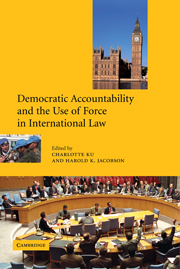Book contents
- Frontmatter
- Contents
- List of figures
- List of tables
- Notes on contributors
- Preface
- List of abbreviations
- I Introduction
- II The domestic and international context
- 2 The interface of national constitutional systems with international law and institutions on using military forces: changing trends in executive and legislative powers
- 3 Domestic political factors and decisions to use military forces
- 4 Collective security, peacekeeping, and ad hoc multilateralism
- 5 The legal responsibility of military personnel
- III Traditional contributors to international military operations
- IV Newcomers to international military operations
- V Permanent members of the UN Security Council
- VI Conclusion
- Appendix A. Uses of military forces under the auspices of the UN and NATO
- Appendix B. Country participation in international operations, 1945–2000
- References
- Index
2 - The interface of national constitutional systems with international law and institutions on using military forces: changing trends in executive and legislative powers
Published online by Cambridge University Press: 30 July 2009
- Frontmatter
- Contents
- List of figures
- List of tables
- Notes on contributors
- Preface
- List of abbreviations
- I Introduction
- II The domestic and international context
- 2 The interface of national constitutional systems with international law and institutions on using military forces: changing trends in executive and legislative powers
- 3 Domestic political factors and decisions to use military forces
- 4 Collective security, peacekeeping, and ad hoc multilateralism
- 5 The legal responsibility of military personnel
- III Traditional contributors to international military operations
- IV Newcomers to international military operations
- V Permanent members of the UN Security Council
- VI Conclusion
- Appendix A. Uses of military forces under the auspices of the UN and NATO
- Appendix B. Country participation in international operations, 1945–2000
- References
- Index
Summary
The perplexities of the twenty-first century over national decision-making in support of international security are an outgrowth of centuries-long trends concerning subordination of military power to constitutional control. Civilian control over the military has been inextricably connected with the strengthening of domestic constitutionalism and safeguards for citizens' liberties in many different democracies.
Along with the establishment of constitutional structures for regulating national military power, national constitutions have contributed to the evolution of contemporary international law prohibiting the use or threat of force in international relations. Milestones along this path begin with the French Constitution of 1791 – the first national constitution to renounce wars of conquest – and include the renunciation of war in the post-Second World War constitutions of Germany and Japan and other countries. Such constitutional provisions have helped consolidate the norm of international law against the use of force embodied in Article 2(4) of the UN Charter: “All Members shall refrain in their international relations from the threat or use of force against the territorial integrity or political independence of any state, or in any other manner inconsistent with the purposes of the United Nations.” National constitutional law in various countries likewise manifests commitments to collective security made within the framework of international organizations.
National constitutional law may have a constraining effect on the external behavior of states, both by restricting the circumstances in which military force may lawfully be deployed and by establishing the procedural framework for taking decisions to use force.
- Type
- Chapter
- Information
- Publisher: Cambridge University PressPrint publication year: 2003
- 6
- Cited by



